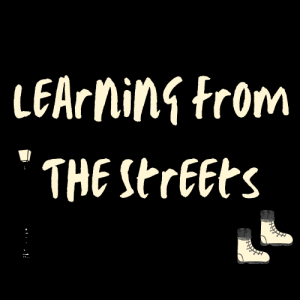I dont do gardening. At least I am in denial that I might be ‘doing gardening’, its more ‘being self sufficient’ trying to live closer to nature, and a whole host of other things that it might be known as , but it isnt gardening. So, that thing that I have been doing the last few years, not gardening, came about as I in herited a whole load of fruit trees and bramble in my garden (great free food) and, I wondered if there was a way of creating some kind of space in it, that the dog wouldnt destroy (she digs) that would mean that not only fruit but other stuff as well would be grown. The first year i got a load of large plastic containers and tried growing peppers, chillis and tomatoes, and ended up with about 90 green tomatoes.
The following year I played safe and instead of tomatoes put salads in the containers and ended up with lettuce, spring onions, beetroot, some herbs and with a few exceptions managed to grow most of them. The same the next year, with the addition of a few potatoes.
But I was given a seedling chili plant from my sister in laws parents, which i put into our sunroom, and watched it grow and grow. It gave us three seasons of chillis during the year, about 100 in all. So this year I am trying out the chillis and peppers again. (and have planted garlic in the pots – so basically I am after the base of a good curry)
Its not remarkable. But what I noticed this time, trying to grow plants from seedlings was that as the seedlings start to grow and expand, you have to increase the size of the pot they are in so that they can expand into it and grow a little bit more. And thats it.
Seedlings will only grow if you expand the pot they grow into. To stop my chili plant growing last year i left it in a fairly large pot – but didnt keep increasing it.
What if this process of ‘pot-expansion’ is the one that we develop with young people and their discipleship? It becomes a process where we as workers/leaders/volunteers continually seek ways of creating a slightly larger, or even much larger ‘pot’ for them to grow into for them to expand.
A Seedling might last if put in the Garden, and in a new phase of ‘not gardening’ I have spend the easter holidays making a raised bed.
It now has several seeds in it. For a young person, that might present having a space expanded too much – for others they might rise to such a challenge of growing into a space that demands that they fill in to.
If Discipleship is a process of ongoing learning (the greek word Mathetese)
and Empowerment a process of ongoing participative competence (the community writer Keiffer)
Then in our work with young people- actually – given the state of the church- in our discipleship with everyone – empowering leadership, that doesnt just tend to the plants (and not bruising the damaged reed) but empowering the competence of others to grow into a larger space might be what is required. What we have is a one-size-fits-all approach with gatherings as large groups or smaller groups – what eah need it not more sprinked water from the top, even plant food, or sunlight (though all are helpful) – but space in which the roots are given the opportunity to grow. and How do we do that? The how is easy. We get to know where people are and create spaces for them to be challenged, why dont you do that? or can you go away, read that and talk to me afterwards, or what are your ideas on that? What difference could you make here? How might we use you better, and your gifts?
If i had a pound for everytime someone said we need to have a culture shift in our churches, on discipleship or mission, then id be able to buy at least a few more packets of seeds. If the farming and growth metaphors Jesus used were good enough for him, then they might be good enough for us now. I think in youth ministry, we are better at ‘pot’ expansion than elsewhere, young peoples horizons are hopefully opened up constantly and are given opportunities at times. It would be very wrong to say that young people are kept in small pots. It would also be wrong however to say that this is the case everywhere. Though sometimes the pot is only slightly bigger, and young people go elsewhere to be challenged.
Whole life, empowering discipleship, believing in the Human person to rise to the challenge, to have their ‘pot’ enlargened, is something i think we need to be doing, and keep doing, and keep asking. How might this church grow- is the current question? – well it needs to be given a larger pot to grow into. How might all the individuals within it grow? you get the picture. When we empower people , sorry, that isnt possible, when people are empowered it is because they are given space to empower themselves, space to grow. If discipleship is about growth, then we have the responsibility as leaders to keep discovering ways, real ways of expanding the pot size. The space for them to grow into. And its not just our responsibility, its also about trying to help the whole church to encourage the potential growth in each other.
By the end of three years, I would be pretty certain that Jesus disciples had had enough, every day presented new challenges, new scearios to act, new learning to take in, new directions about what to do. Constant expanding the space for them to grow into. Hey Peter, heres 5000 people – you feed them!. There seem to be times when Peter and only a few of them get given the opportunities to grow, at least thats what we hear anyway. But the 72 are sent out, as are the 12. They are not just given the ‘opportunity to do mission’ they are given challenges to enable them to grow as disciples.













